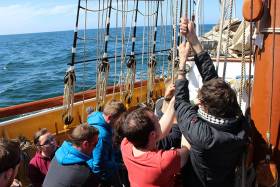Displaying items by tag: Institute of Master Mariners
Tall Ship Celebrations for Cork Sail Training Bursary Scheme
32 young people from all backgrounds and a range of abilities across Cork City and County who have completed Tall Ship voyages aboard the Cork-Based Vessel Spirit of Oysterhaven and the Dutch Tall Ship Morgenster during the 2016 season will celebrate their achievements in Cork today.
The voyages were made possible by the assistance of a group of sponsors including Port of Cork, Cork City Council, Cork County Council, EMC, Ardmore Shipping, The Institute of Master Mariners and the National Maritime College of Ireland.
Due to extra support from Port of Cork, Cork County Council and Cork City Council Morgenster made a visit to Cork in June and hosted events and “open-ship” for public visits in Cork City and in Cobh during the Cork Harbour Festival 2016.
13 trainees from the City and County sailed the ship over 12 days from Belfast, via Isle of Man to Cork. Another 3 Cork trainees sailed from Cork to Amsterdam over 19 days arriving in Amsterdam at the end of June. These trainees formed part of groups with up-to 32 trainees and mentors on each voyage which were part funded using EU “Erasmus +” funding and involved active educational programmes of youth development as part of “Youth Exchange” projects.
The Cork Sail Training Bursary Scheme was established in 2014 to provide access to Sail Training voyages on tall ships and large sailing vessels for young people from the region. Now in its third year the scheme is one of the largest and most active on the Island of Ireland and runs in parallel with similar schemes now in operation under Sail Training Ireland in Belfast, Drogheda, Dublin, Waterford, Wexford, Limerick and Galway. The participants are nominated through a network of youth and community groups in Cork and places are available to young people from all backgrounds and with all abilities.
The scheme has supported approximately 50 trainees since 2014 and looks likely to grow from strength to strength over the coming years.
Also present on the day will be trainees sponsored under one of Sail Training Ireland’s “SafeHaven Voyages” sponsored by “Arthur Cox”. Their voyage on board the “Spirit of Oysterhaven” finishes today, following six days at sea beginning in Glandore County Cork. The vessel will be in Port of Cork and open to visitors after the event.
“The whole experience since we first met until the last moment I will never forget. The scenery, the sea sickness, the lifestyle and most of all the people I spent this journey with. I’ve made some lovely friends and will never forget them.” Cork Trainee 2015.
MC for the event is RTE Radio “SeaScapes” Presenter Marcus Connaughton (Goodwill Ambassador for Sail Training Ireland) and the certificates will be presented to trainees by Commodore Hugh Tully - Flag Officer Commanding Naval Service (F.O.C.N.S.). The Naval Service is a strong supporter of Sail Training for young people as a stepping stone into maritime careers and has recently made the Naval Yacht “Creidne” available for voyages for young people selected by Sail Training Ireland.





























































